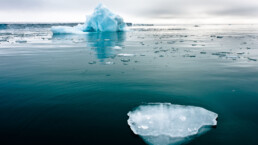Researchers sound the alarm over an “unprecedented ice-free” threat to the Arctic.
by Rebecca Falconer and Andrew Freedman, Axios
It’s too late to stop summer Arctic sea ice melting — even in a low-emissions scenario that caps global warming at a 1.5°C target in line with the Paris Agreement, according to a new study.
Why it matters: The peer-reviewed findings on the effects of human-caused climate change in the region, published in Nature Communications, suggest the first ice-free summer could be in the 2030s. That’s a decade sooner than previously projected.
Thought bubble: Many studies have projected when the Arctic sea ice would be seasonally ice-free, and all could be proven wrong given the nonlinearities and variability inherent in the Arctic climate system.

- One thing is for sure though, there are going to be surprises, many of them in a warmer, less ice-covered direction. Using different techniques to examine these questions is valuable, since the region is already heating up so quickly. That applies to the climate and geopolitics.
What they did: Researchers examined satellite data and climate models from 1979-2019 to see how Arctic sea ice has changed.
Recent Posts
As Trump Bombs Iran, We Need to Reckon With the American War Machine
March 1, 2026
Take Action Now We cannot afford to slip into despair. We must push back against militarism everywhere, at every turn.By Negin Owliaei ,…
Oman’s Foreign Minister Said US-Iran Deal Was ‘Within Our Reach.’ Then Trump Started Bombing
February 28, 2026
Take Action Now “The Omani FM decided to go public,” suggested one observer, “so that the American people knew that peace was within reach when Trump…
A War With Iran Would Not Be a One-Off Event But a Disastrous Ongoing Rupture
February 26, 2026
Take Action Now If Congress cedes its power to stop a war with Iran, it will fully erode any lingering promise of democratic restraint.By Hanieh…
New Addition to List of Nuclear Near Catastrophes
February 25, 2026
Take Action Now Debris flew for great distances — many times the distance of 270 meters to a nuclear reactor and nuclear storage facility.By David…




